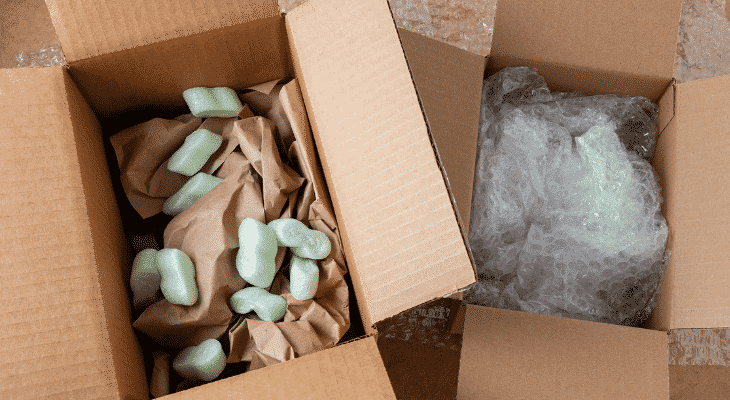In this piece, we unravel the concept of “dunnage” and its pivotal role in shipping and packaging. We discuss the various types of dunnage materials available, their specific applications, and the importance of choosing the right dunnage to ensure the safe transit of goods. By the end of this read, you’ll have a clear understanding of dunnage’s significance and how it can make or break the shipping experience for both sellers and buyers.
Key Takeaways:
- Dunnage refers to the padding materials used in shipping to protect goods from damage, ranging from bubble wrap to solid plastics and even custom options.
- The choice of dunnage can impact the safety of the shipped items, with different types being suitable for various products and shipping conditions.
- Using appropriate dunnage not only ensures the safe arrival of products but also enhances the reputation of the seller by demonstrating care and professionalism.
- Some dunnage materials, like Kraft paper and corrugated paper, are eco-friendly and recyclable, making them sustainable choices for packaging.
- Custom dunnage options are available for items with unique dimensions or specific protection needs, ensuring tailor-made safety during transit.
If you run a business, it’s likely possible that you’ve come across some terminology in your time that you might not be aware of. One of these terms might even be “dunnage.” In this article we will help you figure out what dunnage is and if it’ll be helpful to your business. (Short answer: it’ll be helpful for your business!)
In this guide, we’ll explore:
Dunnage
Dunnage refers to the padding material that is used to protect goods when it comes to shipping. This can be bubble wrap, paper wrapping, packing peanuts, newspaper . . . whatever you might need to use to make sure that whatever you’re shipping won’t get damaged in the middle of shipping.
As mentioned before, there are many types of dunnage. Some have certain benefits over others, but it truly depends on what sort of item you’re sending.
Whatever or whoever manages your shipping – whether that’s you or a WMS on your payroll – knowing the best dunnage that will work for your product will go a long way towards making sure your products make it to recipients safely and undamaged.
Once you’ve done your best to package the item so it arrives safely, slap on that shipping label and pat yourself on the back.
What is the purpose of dunnage?
Nothing is worse – as a buyer or a seller – than to receive a package that comes damaged. Whether it’s the fault of the shipper or the fault of the shipping methods, it can still be very disappointing to open your package and find that the item is broken or has been damaged on its way to you.
That is one of the many reasons why dunnage is important!
Who Needs to Use Dunnage?
Anyone who, even peripherally, interacts with shipping services, needs to have a good idea of what dunnage is. It can be the difference between excellent service and bad service. If you keep sending items that arrive at the customer’s house broken, that won’t be good for business reputation.
Why Is Dunnage Important?
Dunnage is important for making sure that your items arrive at their destination safely. Although some of that might come down to the quality of the item and how well it’s made, it can largely come down to the fact that you need to pack it correctly.
It’s well known that shipping services don’t take the most care when they handle the packages. They will toss items around, drop them, and generally provide the barest amount of care when it comes to working with the packages.
Because of how little care shipping providers take with packages, you must make sure you’re packaging your products as carefully and beautifully as possible. If you’re working with a warehouse management software, make sure to discuss with them how important good and protective shipping is!

Types of Dunnage
As mentioned, when it comes to dunnage, there are certain specific types. Read on to learn more about these types – you will likely find that you’ll come across some that you’ve used in your own shipping experiences.
But you might also be surprised by other types of dunnage you’ve never seen before!
Also, always make sure to include a packing slip. This will help remind the buyer what they bought but it will also help you, as the seller, make sure that you’re shipping the correct item to the correct location.
(For the record, packing slips don’t count as dunnage.)

Solid Plastics
If you only ship smaller things, you may not have come across this type of dunnage, especially considering that it is usually used in industrial shipping or shipping that has a high value.
The reason that solid plastics are typically used for more expensive shipments is that when it comes to packaging costs, using solid plastic bracing as dunnage is expensive.
It can be very beneficial to make sure that your expensive purchase is as secure as possible – which is one of the reasons that solid plastics continue to be used!
Bubble Wrap
This is one of the most common types of dunnage. Big retailers such as Walmart, Amazon, and Target are more likely to use this type of dunnage.
It is also the one that you can most easily buy at shipping locations such as USPS, UPS, and FedEx. Because of how lightweight and padded it is, bubble wrap is great for shipping most everything.
Having said that, it is frequently used for shipping glass or other items that are extremely fragile. Bubble wrap also can be reusable, so long as it’s in good condition!
Wood
Wood is a difficult one to use because it’s so hard. You’ll need to make sure that the wood won’t fall and crush or damage whatever you’re shipping. However, wood can also be used in conjunction with other types of dunnage to provide the most protection.
When it comes to uses, wood can also be used to create barriers between multiple items and is usually used to protect strong or extremely heavy items.
Air Pillows
Similar to bubble wrap, air pillows are bits of inflated air that can be set inside of packages to keep the items in place and prevent damage them from slip-sliding around the box/shipping container.
They are also used to fill up extra or remaining space that might be large enough for items to move around within.
Kraft Paper
This is a type of material made from recycled paper. Although slightly less protective than bubble wrap (depending on how it’s packaged), it tends to be one of the least expensive and most versatile. When it comes to this dunnage, you will usually crumple it up and use it to create padding.
Other reasons why this dunnage is so popular is that not only is it cheap, but it is also eco-friendly (recyclable), reusable, and extremely efficient.
Foam
Foam is another one that you may not have come across when it comes to dunnage. Because of how secure it is, foam is often used to protect medical equipment, electronics, fragile, or sharp pieces.
Imagine the last time that you bought an electronic device, such as a television – whatever packaging it came with was probably foam dunnage.
Steel
Another one that you may not have encountered as a smaller commercial seller is steel. Along with solid plastic, steel is one of the most expensive dunnage options on this list!
Typically, this will be used for high-value shipping and heavy products. The reason it’s a good option is that it can prevent heavy products from damaging lighter ones, which can keep them secure and most protected.
Corrugated Paper
This one is also popular, similar to Kraft paper. Because it’s cheaper, this is another popular dunnage choice that has great construction.
It’s this strong construction that makes it such a good dunnage choice. Because of how versatile and strong the construction is, corrugated paper is used when shipping several products of varying weights, especially when those products have the potential to run into moisture.
This is also a recyclable option, meaning that it’s more sustainable as a packaging option.
Custom Options
If you have a highly specific type of item to ship, you might find that you don’t feel safe with any of the others on this list. You should look into custom dunnage options if that’s the case,.
If you have fragile items or items that have very specific dimensions, you can reach out to custom dunnage providers and they can help you out. They will be able to design specific dunnage for your needs to best protect your products.
Dunnage and Logiwa WMS: Partners in Safe Product Transit
In the realm of shipping and packaging, the significance of dunnage cannot be overstated. Serving as the protective shield for goods in transit, the right dunnage ensures that products reach their destination in pristine condition, reflecting the seller’s commitment to quality and customer satisfaction. As the shipping landscape evolves, integrating advanced tools like Logiwa WMS can further optimize the use of dunnage, ensuring efficient and safe deliveries. Explore Logiwa WMS today and elevate your shipping standards with the right dunnage solutions.
Logiwa is the leading cloud WMS and order fulfillment software for B2C and direct-to-consumer business. Request a Demo and start to scale up your high-volume fulfillment operations. service.
FAQs
What can be used as dunnage?
Anything that is soft and can double as padding would go a long way toward working as dunnage for smaller items. Make sure to avoid hard, brittle items – stick to softer things.
No matter how expensive or inexpensive whatever item you’re shipping might be, imagine that it’s extremely valuable. Then, wrap it in a way that will keep it protected if it gets jostled around in transit.
What might happen if you don’t use dunnage?
If you don’t use dunnage, whatever products you ship might arrive broken. This will mean that customers are unhappy with your services. They’ll tell their friends and loved ones that your service is poor, and you’ll lose future customers and future profits.
What shouldn’t be used as dunnage?
Although you might feel tempted to use anything you have on hand as dunnage, this can be a risk. Especially if what you choose to use as dunnage has extremely hard and sharp edges . . . that would not make for good dunnage. Whatever you use as dunnage needs to not cause damage to whatever item you’re shipping.
Are there better types of dunnage for certain areas?
When it comes to dunnage, the only consideration that might need to be thought about is whether or not the product is coming to or from a humid or very wet location. If the package might get damaged by changing weather situations, it might be in your best interest to use dunnage that will not also be damaged by the weather.
Adjust quickly to ever-changing fulfillment requirements with the most flexible WMS
3PL
Cloud 3PL software for high-volume fulfillment excellence






